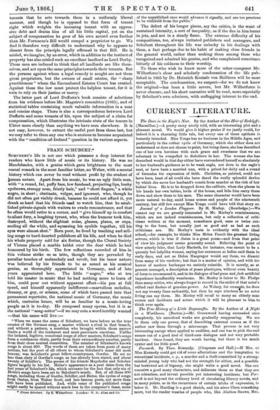FRANZ SCHUBERT.* SCHUBERT'S life is not one which possesses a
deep interest for readers who know little of music or its history. He was no Mendelssohn, with a genius which gave brightness to the most casual remark in the most familiar letter, no Weber, with a mental history which can never be read without profit by the student of human nature. Apart from his music, he WM an ugly little man, with " a round, fat, puffy face, low forehead, projecting lips, bushy eyebrows, stumpy nose, frizzly hair," and "short fingers," a white negro, in short ; obstinate, vulgar, and ignorant, who, though he did not often get visibly drunk, because he could not afford it, yet
drank so hard that his friends used to watch him, that he estab- lished private signals with waiters to evade remonstrance, and that he often would retire to a corner, and "give himself up in comfort to silent fury, a laughing tyrant, who, when the humour took him, destroyed, without the slightest noise, glasses, plates, or cups, smiling all the while, and squeezing his eyelids together, till his eyes were almost shut." Born poor, he lived by teaching and sell-
ing songs to hard-hearted publishers all his life, and when he died his whole property sold for six florins, though the Choral Society of Vienna placed a marble tablet over the door which he had honoured by his birth. The few reflections recorded of him in this volume strike us as trite, though they are pervaded by peculiar touches of melancholy and revolt, but his inner nature was believed by his friends to be as sound as his musical genius, so thoroughly appreciated in Germany, and of late years appreciated here. The little " negro," who at ten told his master in music that he had nothing more to learn of
him, could pour out without apparent effort—his pen at full speed, and himself apparently indifferent—marvellous melodies, dreamy, or gay, or solemn, some of which have passed into that permanent repertoire, the national music of Germany, the music which, centuries hence, will be as familiar to a music-loving people as it is to-day. He composed many operas, but it is as the national "song-setter"—if we may coin a word terribly wanted
—that his name will live :—
"When we name the name of Schubert, we have before us the true creator of the German song, a master without a rival in that branch, and without a pattern, a musician who brought within those narrow limits a world of the tenderest and most passionate emotions. Unlike the isolated, fugitive, occasional songs of other masters, Schubert's songs form a continuous chain, partly from their extraordinary number, partly from their close mutual connection. The number of Schubert's known songs is about 600. The words of them are taken from poets of many nations, but the poet of all others to whom Schubert's muse did most honour, was Schubert's great fellow-countryman, Goethe. He set no less than sixty of Goethe's songs, as has already been stated, and about twenty of Schiller's. The poems of his friends Mayrhofer and Schober figure largely in his list. Heine's appearance as a poet dates from the last years of Schubert's life, which accounts for the fact that only six of Heine's songs have been set to Schubert's music. But, of all these 600 songs, including those of Goethe, Schiller, and Heine, the cycles of songs from Ossian, from Walter Scott, and less famous poets, not more than '360 have been published. And, while some of the published songs -might easily be spared without much loss to the composer's fame, some • Franz Schubert. By E. Wilberforce. London : W. H. Allen and Co.
. of the unpublished ones would advance it signally, and are too precious to be withheld from the public."
The defect of his longer pieces, say the critics, is the want of sustained intensity, a sort of inequality, as if the fire in him burnt in jets, and not in a steady flame. The extreme difficulty of his compositions, too, always irritated publishers and managers, and Schubert throughout his life was unlucky in his dealings with them, a fact perhaps due to his habit of making close friends in the general world, rather than seeking them among those who recognized and admired his genius, and who complained sometimes bitterly of his coldness to their worship.
To those who wish to know more of the usher-composer Mr. Wilberforce's clear and scholarly condensation of the life pub- lished in 1865 by Dr. Heinrich Kreissle von Hellborn will be most acceptable. The condensation, we suspect—for we do not know the original—has been a little severe, but Mr. Wilberforce is never obscure, and his short narrative will be read, more especially by Schubert's own admirers, with unflagging interest to the end.






























 Previous page
Previous page